


|
| ||
|
|
|
|

|
SILVER EDITION

|


|
SILVER EDITION |
Betty says No! - The Ballantine Rejection
by Simon van Meygaarden
|
Intermezzo
Ballantine Full Cover Series Ghost Dance |
Assassin of Gor
Raiders of Gor Ballantine Black Title Series |
Captive of Gor
The refusal Afterword |
The publication history of John Norman in the United Kingdom begins in 1969 with the release of Tarnsman of Gor by the London based publisher Sidgwick & Jackson. The next two years Outlaw of Gor and Priest-Kings of Gor are published, followed in 1972 by a hardcover Gor Omnibus containing the first three volumes, and the UK release of Ghost Dance by Sphere, London.
On the American continent, the Ballantine story continues.
 Ballantine Full Cover Series
Ballantine Full Cover Series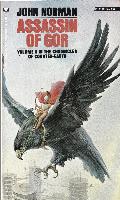
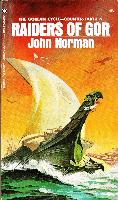
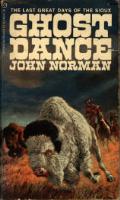
 Ghost Dance
Ghost DanceIn May, 1970, John Norman publishes Ghost Dance (Ballantine Books 01924), with full-cover artwork by Thomas Beechum. Without any reference to his Gor-series, the back-cover reads:

Standing Rock, Dakota...
In the summer of the year preceding the Massacre of Wounded Knee, there was much unrest among the recently defeated Sioux. For defeat did not sit easily on these warriors of the great plains - the transition from fighting nomad to reservation farmer did not take place, and there were those who rode secretly with the call to the Ghost Dance and war.
In that fateful summer there came to Standing Rock a white man, a doctor, fleeing from the threat of death - Edward Chance, who, willy-nilly, would become blood brother to the Sioux and play a powerful part in their last great uprising.
A broad, sweeping pioneer historical, rich with the color, the life, the terror of a time that will never be again.
Ballantine Edition, Ghost Dance, 1970
Man is more than mere mortal, more than meager mechanical mind. Surely, there are the bones, the flesh, the vessels, the tissues, the organs, the exchange of gases, the processes of circulation and oxidation, but there is too perception and knowing, recognition and reflection, the being able to be other than one has been; so man is more - we must be more; until we know this is false, or until we have evidence that it is false, we will believe this to be true; that we are more than we know, for that is how we are - a curious being. We look back, often, and sometimes in anger.
The clash of cultures that culminated on that crisp, winter clear morning of December the 29th, 1890, at the banks of the Wounded Knee Creek, destroyed more then the souls of a great people. It changed the country and the land, the earth and the soil, too. Yet reality, the world itself, is always changing. Panta Rei, all thing are in flux, had said the dark Ionian mystic Heraclitus of Ephesos, son of Vloson, as he compared the soul to a spider which rushed to any part of its web which is damaged, and with that spark of the essential substance of the stars, the human being must have seemed to him a rational spider, a fool, a jester, a Nar. It is the opposite which is good to us, he had said, despising sameness; and that war is father and king of all, and some he shows as gods, others as men; some he makes as slaves, yet others free; mortal immortals, immortal mortals, knowing not how to listen nor how to speak, living their death and dying their life, in a world of everliving fire, where Nature loves to hide.
Once it had been younger, if not gentler. Once it had been green; it had had water, trees, grass; once in this place the large soft-footed cat had followed the delicate antilope; once here long ago, before the eyes of man were here to see, there had trembled in this place the stirring of seeds, the opening of flowers, the lifting of the leaves of trees to the sun and the rain, and here too had occurred the inevitable rhythms of flight and feeding; here had been enacted, as a matter of course, the swift, remorseless rituals of the prey and his predator; here in this place had occurred innumerable events, patient, abrupt, sometimes brutal, sometimes beautiful, concealed, unwitnessed remote events, the traces of some of which, in virtue of the exchange of chemicals, were recalled in a fortuitous scattering of whitish stones, some which more clearly than others remembered the shape of teeth, the curve of a shard of skull, the form bones.
In Ghost Dance it is the character of Edward Chance that enables John Norman to return to a younger Earth and sense the biological background of human emotion. On the bones of their enemies, the victors will dance and claim their prize. The final battle is fought for survival; the possibility of offspring, the dominance of the selfish gene, and the final prize is female.
And Chance sensed then, as he never sensed before, the ritualization of courtship, the meanings of the stylized amenities he had found so much a nuisance so many years ago, the teas, the supers, the dances, the visits here and there, the formal calls on Sunday afternoons; all of it, said Chance, is this: pursuit and capture, dignified, made acceptable; no longer do they flee from us like deer through the forest, to be driven into bush of backed against rock, to be cornered and bound, and lead back as brides; no longer; and here, in this place, her meaning as woman is clear; here, apart from symbols and disguises and distortions and frivolities, she stands as a woman, the prize of man; does she, this woman, now know her femaleness; does she understand; is the meaning of her excruciatingly desirable body now brought home to her; does she now understand the significance of her sex, that she is female, that nature has destined her for man?
 Assassin of Gor
Assassin of GorStill the Gor-series is continued with iron regularity, for in December, 1970, the fifth Gorean book, Assassin of Gor (Ballantine Books Fantasy Adventure 02581) is published with new cover-art by Gino D'Achille.

The Trail of Vengeange
Kuurus was one of the dread caste of assassins on the hidden world of Counter-Earth. He was hired for twenty pieces of gold to avenge the death of a warrior. Now he was on his way to the great city of Ar, where he was forbidden by ancient sentence of death ever to appear again.
He knew nothing of his intended victim, save that the man had taken part in the savage tarn races of the Arena of Ar. And all he knew of the man he was to avenge was a name.
The name was that of Tarl Cabot, the great warrior and servant of the all-powerfull Priest-Kings. And that was strange.
Because the true name of Kuurus was Tarl Cabot!
Ballantine Edition, Assassin of Gor, 1970
Gor has become a game, and its name is "Kaissa," which is Gorean for "Game." It is a general term, but when used without qualification, it stands for only one game. A game board of checkered red and yellow squares, with ten ranks and ten files, giving a hundred squares, and a leather bag containing the pieces, twenty to a side, red and yellow, representing Spearmen, Tarnsmen, the Riders of the High Tharlarion, and so on. Those who carry such equipment are generally known as Players.
The Players are not a caste, nor a clan, but they tend to be a group apart, living their own lives. They are made up of men from various castes who often have little in common but the game, but that is more than enough. They are men who commonly have an extraordinary aptitude for the game but beyond this men who have become drunk on it, men lost in the subtle, abstract liquors of variation, pattern and victory, men who live for the game, who want it and need it as other men might want gold, or others power and women, or others the rolled, narcotic strings of toxic kanda.
John Norman has become a Player, too. The series is gaining popularity, the story-line gets more complicated, and the details of the Gorean culture are enriched and magnified. But the consequence of the cultural, psychological and biological foundation of the Gorean society will have its inevitable impact on the rules and rituals of this barbaric community. Slavery on Gor is out in the open, and slaves are sold publicly at slave-auctions. On such occasions, emotions run wild when the girls dance upon ancient rhythms.
The Musicians took up their instruments and, together, as three slaves, women who would be owned by men, the girls danced
In the crowd men cried out with pleasure; I heard even gasps from women, perhaps amazingly, startled that their sex was capable of such beauty; the eyes of some of the women' shone with ill-concealed admiration and excitement; I could mark the quickness of their breath in their veils; the eyes of others seemed terrified, and, shrinking, they looked from the block about themselves, suddenly fearing the men with whom they shared the tiers; I heard the tearing of a veil and heard a girl scream and turned to see her lips being raped by the kiss of a Warrior, and then she was yielding to him; the crowd went wild; here and there was the cry of a woman in the throng who was seized by those near her; one girl tried to flee and was dragged screaming by the ankle to the foot of a tier; another woman, with her own hands, tore away her veil and seized in her hands the head of a man near her, pressing her lips to his, and in a moment, she lay, robes torn, in his arms, weeping, crying with pleasure.
Four dances the girls danced while the crowd screamed and roared, and then, at an instant, their dances ended, they stood suddenly motionless, splendid, animal, magnificent, inciting.
Then they, breathing deeply, stained with sweat, stepped back on the block, and the auctioneer stepped forward.
He did not even call for a bid.
 Raiders of Gor
Raiders of GorIn December, 1971, Assassin of Gor is followed by Raiders of Gor (Ballantine Books Fantasy Adventure 02447), again with artwork by Gino D'Achille, who would also be responsible for the Ballantine edition of "Dragonquest" and "Dragonflight", both within Anne McCaffrey's series The Dragonriders of Pern, and while working with Donald Wollheim, for the cover of Tanith Lee's "The Storm Lord" in May, 1976.
Together with Raiders of Gor a second printing of Nomads of Gor, and third printings of Tarnsman of Gor, Outlaw of Gor and Priest-Kings of Gor are released, still using the old Red Book cover-design.

IN THE SERVICE OF THE PRIEST-KINGS...
Tarl Cabot makes his way to Port Kar, sink-hole of Gor, home to every outlaw and pirate on the planet -- Port Kar, crowded, squalid, malignant, preying on the ships that sailed the beautiful sea of Thassa. To such a city came Tarl Cabot...
Ballantine Edition, Assassin of Gor, 1971
In the marches of delta of the mighty Vosk river, making his way to the city of Port Kar, Tarl Cabot, on his mission in service of the Priest-Kings of Gor, is captured by the Growers of the Rence. He has come to the seeings of manhood, and found within himself, unexpectedly and disgustingly, something capable of cowardice, self-indulgence, selfishness, and cruelty. He is no longer worthy of the red of the warrior, no longer worthy of serving the Home Stone of his city, Ko-ro-ba, the Towers of the Morning; to him, there are only winds and strengths, and the motions of bodies, the falling of rain, the movements of bacilli, the beating of hearts and the stopping of such beatings. He is alone.
"What is your name, Slave?" asked she.
"Tarl," said I.
She struck me savagely, across the mouth, flinging my head to one side.
"A slave has no name," she said.
"I have no name," I said.
She walked about me. "Your back is broad," she said. "You are strong, but stupid." She laughed. "I shall call you Bosk," she said.
The bosk is a large, horned, shambling ruminant of the Gorean plains. It is herded below the Gorean equator by the Wagon Peoples, but there are bosk herds on ranches in the north as well, and peasants often keep some of the animals.
"I am Bosk," I said.
There was laughter.
The series has entered puberty and suddenly, as if looking in a mirror, the image is changed from smiling agreement and tender compassion to ruthless indifference and senseless violence. All men and all women, have within themselves these despicable elements, cruel things and cowardly things, things vicious, greedy and selfish, ugliness that we hide from others, and most of all, hide from ourselves. The human being, you see, is a chaos of cruelties and nobilities, of hatreds and of loves, of resentments and respects, of envies and admirations. It has been written that man contains within himself, in his ferments, much that is base and much that is worthy. These are ancient truths, but few men truly understand them. And yet, humanity must somehow assert itself, when faced with a meaningless, inevitable death; it must grovel and whine for its life, its survival and hence it chooses, as warriors have it, ignominious bondage over the freedom of honorable death. In dishonoring the sword, the city, and even the codes, man eventually can find humanity. It is only in such moments, perhaps, that man might learn that all truth and all reality is not written in codes, that men and women will do cruel and despicable things, but neither of them will be lost, or destroyed, or beyond reach. Both of them can learn, both of them then knowing themselves as they did not before, and in knowing themselves they will be better able to know others, their strengths and their weaknesses.
But most perhaps, incredible as it might seem, I feared that if I asked for a kindness, even a word or a gesture, it would be refused. Alone and slave, beaten and degraded, I found myself desperately in need of something, be it almost nothing, to indicate that I was a man, a human being, something that might, to some extent or degree, be worthy of respect or understanding. I think that if she, this proud woman, before whom I felt myself nothing, she my mistress, if she had but cared to speak a word of simple kindness to me I might have cried out with gladness, willingly serving her in all things she asked. But if I should but beg a kindness, humbly, I feared it might be refused, that she might reject me in this as she had in all other things, my manhood and my humanity. And fused with this, excruciating in the pain of it, was my desire for her, the crying out of my blood that she had so, and deliberately, aroused.
There is only one last obstacle to conquer, and neither of them, men nor women, even now, in our enlightened days, fully understand it. Their pride, that of both of them, might prevent them from learning. When you have lost all your images of yourself, and learned your humanity, in the diverse ways of gender, and your shame, and you abandoned your myths, your songs, and would accept only the meat of animals, as though one so lofty as yourself must be either God or beast; then your pride might demand either the perfection of the myth or the perfection of its most villainous renunciation - if you are not the highest, your pride demands to be the lowest; if you are not the best, then to your pride you are nothing less than the worst; for if there is not to be the myth, pride seems to think, there is to be nothing at all.
Tarl of Bristol lived only in songs. There was no such man. There were, in the end, only gold and steel, and perhaps the bodies of women, and perhaps songs, the meaningless noises that might sometimes be heard in the mouths of the blind.
Stripped of pride, there is something between the fancies of poets and the biting, the rooting and sniffing of beasts. Its name is Man.
 Ballantine Black Title Series
Ballantine Black Title Series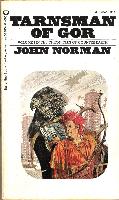
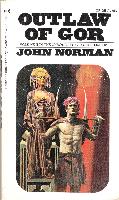
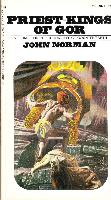
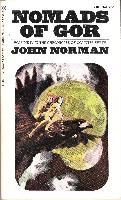
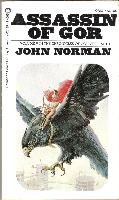
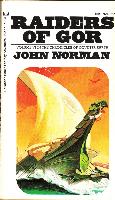
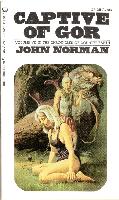
At the start of 1972, Intext, the owners of Ballantine Books, sold the company to Random House and Betty and Ian Ballantine, who'd had a fairly hands-on relationship with Ballantine under Intext, were literally kicked upstairs. The entire Gor series was reprinted during that year using a new cover design.
Donald A. Wollheim quits his editorship at Ace and after cutting a distribution deal with New American Library, founds his own publisher, DAW Books, completely specializing into the field of Science Fiction.
 Captive of Gor
Captive of GorThe seventh volume of the Gor series, Captive of Gor, is released in December, 1972 as Ballantine Fantasy Adventure 02994, together with fourth printings of Tarnsman of Gor, Outlaw of Gor and Priest-Kings of Gor, third printings of Nomads of Gor and Assassin of Gor and a second printing of Raiders of Gor.

Abduction from Space
Spoiled, rich young Elinor Brinton was no longer on Earth. She had been kidnapped from her New York apartment and carried across space to Gor by alien slavers.
Then the ship was wrecked and she was stranded on the strange world of Counter-Earth, where woman were only property, to be beaten and subjugated at the will of the men who were their Masters.
Life to her became a never-ending nightmare.
In the great luxury city of Ko-ro-ba, she was trained in the provocative skills of a pleasure slave. In the Northern Forests of Gor, she was captured by the fierce outlaw Panther Girls.
And finally came Rask of Treve to teach her what all woman should learn!
Ballantine Edition, Captive of Gor, 1972
With Captive of Gor, the series entered a new literaric realm with a slightly more explicit sexual content and, from a marketing point of view, a highly efficient gender-change of the protagonist, as this first of the slave- girl books is written entirely from a female point of view.
Gone are the long, repeating, even ruminating ponderings and ice-cold, emotionless break-downs of reasons, causes and origins of the typical male mind, when they are seductively replaced by the multi-layered, entwining threads of feeling within the cycles of an emotion-driven female. The change of style is so obvious, that some have even considered the involvement of ghost-writers. An absurd consideration, it seems, and one explicitly denied by the author, but, perhaps, too, a clear sign of craftsmanship. A view to a kill, through the eyes of a woman.
Indeed, I wondered if the husbands would dare to know their own wives so thoroughly, that thoroughly, as a slave girl is known. I wondered if the wives would be terrified, to be so known. Would they then feel "too slave"? I wondered how many husbands kept their wives as slaves within their marriage, how many wives stripped and knelt upon command, how many served unquestioningly, how many begged for pleasure chains, how many were subject, if found displeasing in any particular, to binding and the lash. I wondered how many couples related in this manner, man dominant, the master, woman submissive, slave. I wondered how many couples might be so precious to one another. Each so magnificently and joyously fulfilled, living the bio truths of human nature, of man and woman, of masculine and feminine, of dominance and submission, how could either even consider leaving the other? I thought of the emptiness, the vacuity, of so many marriages. Might they not be redeemed, perhaps by so little as an act of will, a command, and a handful of thongs?
John Norman supposes that a woman, like a man, has buried instincts, of which they may not even be aware, but these instincts lay within them, dispositions to respond, dispositions locked into the very genetic codes of her being, instincts awaiting only the proper stimulus situation to be elicited and emerge, overpoweringly, irresistibly, sweeping her, perhaps to her astonishment and horror, in a biological flood to her destiny, a destiny once triggered as incontrovertible and uncontrollable as the secretion of her glands and the mad beating of her heart. To be swept off her feet by passion and be transformed into a sexual animal, relishing his domination; wanting to be his; rejoicing to be owned; loving to be his property, and to be regarded as, and treated as, what she is, his property.
Beside the hearty, unapologetic, magnificent lust of the Gorean male the sexual desires of the typical man of Earth, confused, sexually reduced, defeated, are, I fear, mild indeed. I wonder if the typical man of Earth could even understand the passion of the Gorean male.
He is not interested in working out "meaningful sexual relationships," but in placing his woman, as he wishes, in the most meaningful of sexual relationships, bondage. He is not interested in treating her as a pretended equal, but in putting her to his feet, before him, in her place, naked and chained. He is not concerned with contractual niceties designed to cripple and stunt his manhood but with biological realities.
The Gorean man desires to own his female, to possess her absolutely, to have all power over her, to have her, hurrying and kneeling, at his beck and call.
 The refusal
The refusalDuring Betty's tenure as science fiction editor for Ballantine, she had relied often on the counsel of author and editor Frederik Pohl, but Fred moved to Ace to briefly fill the void created by Donald Wollheim's departure, and Betty Ballentine hired Judy-Lynn Benjamin del Rey, formerly Pohl's managing editor at Galaxy and If magazines, to assist with the editing and during the spring of 1973, Judy-Lynn became senior editor at Random House.
Then, during the second half of 1973, the eight installment of the series, Hunters of Gor, is suddenly refused by Ballantine. John Norman explains:
Betty Ballantine objected to Hunters. We had a signed contract but the book was rejected without explanation.
I heard nothing further for some time. Finally I asked. Ian Ballantine, who was rather embarrassed about the whole matter, speculated that Betty's problem with the text was the fact that the book contained sexual matter as part of the rich background of a barbaric culture.
I was told the problem was not sex. I inferred it must be political. Further experiences confirmed this hypothesis.
John Norman, 1996
At the verge of 1974, only eight years after his initial take-off, John Norman feels the first resistance against his magnificent world of Gor.
TO BE CONTINUED
 Afterword
AfterwordThe first version of this article was written in January, 2002, and first published on February 1st, 2002, as Feature Article, by The Gorean Voice. It was slightly edited and enhanced in 2008, scheduled to be published at the Chronicles of Gor, in July, 2010. We never got around to it, and in September, 2012, due to internal problems, the publication was cancelled.
For this enhanced version, I improved the layout, added a table of contents, added new cover images, turned them into links, and added this afterword.
"Betty says No! - The Ballantine Rejection" was written by Simon van Meygaarden,
and first published as "The Ballantine Rejection" in The Gorean Voice - February 2002 - Vol IV Issue 8 - #44,
under copyright ® 2001 by The Gorean Group, Inc.
This enhanced and updated version was created in August, 2012.
Copyright ® 2001/2012 by Simon van Meygaarden. All Rights Reserved.
 This page is copyright © 2000/2013 by Simon van Meygaarden & Jon Ard - All Rights Reserved
This page is copyright © 2000/2013 by Simon van Meygaarden & Jon Ard - All Rights Reserved